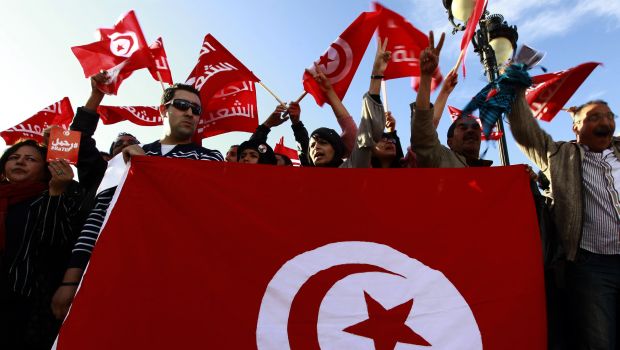
Tunisian protesters hold a giant national flag during an anti government demonstration on November 15, 2013 in Tunis (AFP PHOTO/FETHI BELAID)
Tunis, Asharq Al-Awsat—Taïeb Baccouche, Secretary-General of the Tunisian Call Movement, confirmed on Sunday that a number of parties are seeking to join the secularist Union pour la Tunisie electoral alliance ahead of presidential and parliamentary elections planned for later this year.
In comments to Asharq Al-Awsat, Baccouche revealed that the centrist L’Initiative Party led by Kamel Morjane and the Tunisian National Movement led by Touhami Abdouli have both requested to join the Union pour la Tunisie, adding that the requests are under consideration.
No official date has been set for the Tunisian elections, which will be the second ballot since the 2011 uprising that ousted former president Zine El-Abidine Ben Ali and the first since the adoption of a new constitution earlier this year.
Tunisia’s Independent Election Commission has acknowledged that it is facing significant challenges amid delays to the new electoral law, but has pledged that elections will be held on time sometime later this year.
Baccouche called on parties wishing to join the Union pour la Tunisie to hold off for applying to join until the electoral alliance can form a technical committee to consider each request on its own merits. He confirmed that the technical committee will be comprised of representatives of each party within the alliance which so far includes the Tunisian Call Movement, the Al-Massar Party, the Tunisian Socialist Leftist Party (PSG) and the Patriotic and Democratic Labor Party (PTPD).
The electoral politicking comes following the end of a political crisis that ended with the resignation of the former “troika” government and the formation of a caretaker cabinet until new elections can be held. The Islamist Ennahda Party, along with the secular Congress for the Republic (CPR) and Ettakatol parties, will likely compete against one another in the elections, with many analysts believing that smaller parties will have to ally to have any chance of securing victory.
Baccouche confirmed that the Union pour la Tunisie is seeking to form a strong and unified electoral alliance, led by the Tunisian Call Movement, to compete in the parliamentary and presidential elections on a joint list. He added that the Union pour la Tunisie, which is led by former Prime Minister Beji Caid El-Sebsi, will also back a single candidate for the presidential elections.
Speaking to local media earlier this month, Sebsi acknowledged that it would be “difficult” for elections to take place on schedule, particularly given that voter registration would require additional time.
In an interview with the Washington Post in December last year, Sebsi did not rule out a presidential bid.
He said: “It’s not forbidden to participate in presidential elections. The president is elected by the public. If, on the day of presidential elections, I feel that I am up to such a function, then I can participate.”
